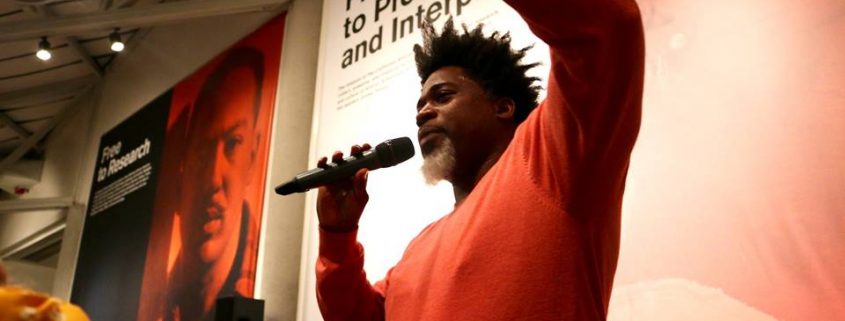David Banner lectures on post-Obama activism
On Wednesday, Grammy award-winning producer David Banner stepped onstage to address an enthusiastic, passionate crowd of hundreds in his discussion, “Activism in Post-Obama America,” hosted by the California African American Museum in Exposition Park.
The venue reached full capacity for this popular event. Many late arrivals gathered outside, watching through tinted windows and hoping to catch a glimpse of the renowned producer and activist.
Banner commanded the stage in a bright salmon sweater and blue jeans. His casual appearance created an open and welcoming atmosphere between himself and the crowd even before the lecture began.
Banner began his talk casually, walking through the crowd, taking selfies with audience members and cracking jokes into the microphone. However, he immediately switched gears as he dove into the meat of his argument.
The crowd quieted down, as phones were tucked away and recordings paused. Banner explicitly told the crowd he did not want any phones present during his talk — he did not want to be recorded.
It wasn’t that Banner didn’t want his speech to be accessible to an audience greater than the crowd in the lobby, but Banner argued that change will not occur in the comfort of one’s living room. If a member of the audience were to record his speech and watch it from their home, the entire discussion would be ineffective, Banner said.
After earning his audience’s full attention, Banner began to discuss the current political climate of the United States and how this present state came to be. He said he was not confused as to why Trump was elected; instead, he sought to explain the events that foreshadowed this election outcome.
Banner addressed former President Barack Obama’s symbolic concept of change — void of any concrete approaches to solutions for the black community. Banner said that because so many voters bought into Obama’s vision for change, there was less of an urgency to act out and ensure the rights of their people.
According to Banner, Trump is the best thing to ever happen to black people.
“We’ve never been so angry, and if we do not work to make a change, we will perish,” Banner said.
Banner segued into the importance of molding the future generation of Americans from this topic of change. This form of activism, Banner thought, would be a great starting point. Instead of bullying, condemning and shaming others, Banner suggests treating people like gods.
“What if we taught our children that they’re gods?” Banner asked.
In an attempt to answer, Banner predicted that maybe these children would start acting like gods, so they will be treated like gods.
Banner had unique perspectives and ways of thinking about certain issues. One of his points with regards to activism was self-love. He urged the black community to love themselves before they could help anyone else. He used his own culture’s appearance to explain this. Banner emphasized the beauty of black culture and described its connection to God.
Banner talked about the prevalence of faith in his community, but he rejected the idea of letting God take over. He claimed that action must be taken by individuals themselves.
Throughout his entire speech, Banner never demanded the audience’s attention. He never forced his own opinions down the crowd’s throat, nor did he say his opinions were necessarily right. Instead, Banner asked for his audience to just consider his words and independently think for themselves. Banner often told the audience to stop amid their clapping and challenged them to think if they truly agreed with what he was saying.
Banner touched on racism throughout his speech. He expressed that the problem did not stem from the racism of other communities, but rather the lack of racism in the black community. Banner did not mean to say that the black community should act deliberately racist, but rather demand change and act to improve their situations. His suggestions for change came in the form of three solutions.
“[The black community should] gain knowledge of the self and their own God, be able to produce [their] own goods and to love [themselves] before being able to do anything for [themselves],” Banner said.
Though Banner’s speech went in several different directions, his main points came across decently well.
His only intention was to inspire his audience to take action for themselves. Banner emphasized that change starts from within, and once individuals are able to help themselves, then they can start helping others.

